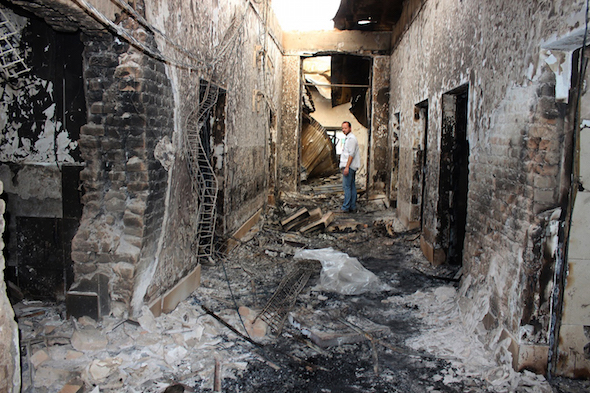Beyond ‘Blowback’: Islam and Terror
SPECIAL FEATURE, 6 Jun 2017
5 Jun 2017 – The latest attack in London – the third to hit Britain within seventy-five days – is once again provoking a debate about the relationship between Islam and terrorism. On one side we have those who say Islam is inherently violent, and is incompatible with the basic canons of Western civilization. On the other side, we have liberals who say that this is a libel on an entire religion, and that advocates of religious violence are a distinct minority within the Muslim faith.
These two views have distinct policy implications: the former would impose what amounts to a Muslim ban on travel to Western countries, and would furthermore mandate State surveillance of mosques and other religious institutions of that faith. The latter stance would oppose these measures, and proceed as if Muslims posed the same danger to us as, say, Presbyterians, i.e. none at all.
Both views are simplistic nonsense. Furthermore, neither offers an effective policy to deal with the problem as defined.
The origins of Islamic terrorism are not in dispute: the idea that “they hate us because we’re free,” i.e. because of our secular values and Western lifestyle, was not even worth considering, at least initially. After all, Japan, for example, which is not exactly an exemplar of Islamic values, has never been attacked by Islamic extremists. South America has proved similarly immune. The focus of the Islamists’ wrath has been on the United States and Western Europe – not coincidentally, those countries which have a long history of intervention in the Muslim world.
Which brings us to the theory of “blowback,” the idea that the root cause of radical Islamic terrorism is simple retaliation. Here the writings of Chalmers Johnson, whose book, entitled Blowback; The Costs and Consequences of American Empire, was published before 9/11, and also of Robert Pape, who has done yeomen’s work on this issue, are very useful. Johnson put the concept in its historical context, and Pape shows, with extensive detailed evidence, that occupied peoples routinely adopt such tactics as suicide bombings to fight the overwhelming presence of occupiers. And this is not limited to Islamists, by any means: the Tamil Tigers, fighting for the “liberation” of Sri Lanka, for example, employed these same tactics.
And so the “blowback” concept, in its pure form, avers that this isn’t about religion, but about resistance: the resistance of a militarily weak insurgency against an occupying power that exerts overwhelming force. Adherents of this theory point to the statements of the terrorists themselves, principally al-Qaeda, which declared that the presence of US troops on the “sacred” soil of Saudi Arabia motivated – and justified – the 9/11 attacks. Aside from that, they point to other examples of Western imperialism – the invasion and occupation of Iraq, US support to Muslim despots, and the ongoing “war on terrorism” that, from their perspective, is a war on Islam.
So it’s all very cut and dried, simple really – but is it?
It’s been sixteen years since the 9/11 attacks, long enough for a strand of Islam to emerge that views terrorism against Western targets as a religious duty. Furthermore, the radical Islamist critique of Western values and lifestyle as morally corrupt has been integrated into the purely consequentialist idea of “blowback” as retaliation for specific actions. Because it can surely be argued – especially by religious ideologues – that a society capable of killing hundreds of thousands in, say, Iraq, is inherently depraved. Given the theory of “blowback,” this merging of a typically anti-colonialist narrative with a moral critique was inevitable. And to give it a religious angle wasn’t difficult. After all, in the years since September 11, 2001, have the US and its allies attacked any non-Muslim countries?
And it’s not as if there aren’t elements within orthodox Islam that need only elaboration to legitimize this mutant variation. The very concept of jihad, and the storied history of Islamic conquerors who “converted” new adherents by force, feed into this frenzied fundamentalism, which seeks to return to a “purer” form of Mohammed’s creed. Of course, one could point to similarly aggressive tendencies in Christianity, as well as other faiths, and yet the missing element here is a history of military occupation and conflict.
Religious belief, like all human concepts, isn’t static: it undergoes changes in response to events. It adapts, it mutates, it evolves. Christianity changed in response to the advance of science: Galileo is no longer considered a heretic. Judaism was transformed by the Holocaust: Zionism, yesterday embraced by a tiny minority of Jews, is dominant today. Islam is not immune to the tides of history.
Western liberals downplay this uncomfortable truth because they generally disdain religion and fail to appreciate its power. They cannot understand how a person could drive a truck into a crowd of pedestrians, and go on a stabbing spree, while shouting “This is for Allah!” Allah, for them, is a delusion: religion is a primitive throwback, a reactionary atavism that is on its way out. Yet this is hardly true in most areas of the world outside of the Global Metropolis.

An employee surveys the charred remnants of a Doctors Without Borders hospital in Kunduz, Afghanistan, after it was hit by a U.S. airstrike in early October. Weeks later, a Doctors Without Borders hospital in Yemen was struck. (Najim Rahim / AP)
The failure of Western liberal elites to acknowledge this reality – the reality of a newly militant strand of Islam that upholds terror as a sacred duty – is linked to their appeasement of the Saudis. For years the Kingdom has exported its austere version of Islam, Wahabism, which serves as the theological foundations of the very terrorist movement we are supposedly pledged to fight.
A few days before the attack on London Bridge, the news broke that an investigation into the sources of terrorist funding commissioned by the government of former Prime Minister David Cameron would probably not be published due to its “sensitive” nature: there’s too much evidence that the Saudis are the principal financiers of terrorist organizations.
Britain recently signed off on a series of multi-billion dollar arms deals with the Saudis: the US has done the same, in a deal brokered by none other than the President’s son-in-law. Meanwhile, Donald Trump travels to the Kingdom where an “anti-terrorist center” is inaugurated – by the very folks who are funding radical Islamic terrorism worldwide.
The West has done everything possible to encourage the growth and development of radical Islamic terrorism, from invading the Muslim world to succoring and supporting the state sponsors of terrorist organizations. We armed and funded Islamic extremists in Syria in a bid to overthrow the secular despotism of Bashar al-Assad – and then wondered how and why returnees from that conflict took their holy war to the streets of Europe’s cities. One wouldn’t have acted any differently if the goal had been to deliberately create a terrorist menace.
And what is the solution offered by our rulers? British Prime Minister Theresa May says we must regulate the Internet, which is now supposedly a “safe space” for terrorists:
“We cannot allow this ideology the safe space it needs to breed – yet that is precisely what the Internet, and the big companies that provide Internet-based services provide. We need to work with allies democratic governments to reach international agreements to regulate cyberspace to prevent the spread of extremist and terrorism planning.”
The British government already regulates the Internet and its powers have been used primarily to quash alleged anti-Muslim sentiment: you can be arrested and charged with a “hate crime” for saying the wrong thing about Islam on Twitter or in a blog post. The “Investigatory Powers Act” was passed by Parliament in November: it requires Internet providers to maintain a list of web sites visited by all Internet users for up to a year, and also gives the government broad powers to intercept communications. May wants to internationalize this regulation.
It’s hard to believe that May and her cohorts really think this will have the least effect on terrorist activities. It’s clearly just a pretext to regulate a phenomenon that threatens the powers-that-be. Rather than combat terrorism, the idea is to extend the authority of government as far as they can get away with – and, as the terrorist wave rises, there’s no telling how far they will go.
Not only are Western governments uninterested in actually stopping terrorism, but the terrible truth is that there is no stopping it. Some problems have no solution, and this is one of them. We can wipe out ISIS in Syria, but they will scatter worldwide, returning as “refugees” to the cities of their enemies. We can restrict travel, reject Muslim immigrants: and yet the second and third generations, already embedded in Western societies, will take up their cause. We can spy on our own citizens, regulate the Internet within an inch of its life, restrict “hate speech,” bomb more Muslim countries – and still the monster’s tentacles will wriggle through the interstices and grasp at our throats.
This is what we have unleashed on ourselves: a monster that won’t be killed. The idea that we cannot live with this is akin to the idea that we cannot live with our own history: it is an idea without meaning. The past is prologue: it won’t be repealed or denied. We invaded Iraq. We invaded Afghanistan. We funded and armed al-Qaeda during the cold war, in league with our Saudi allies, while Riyadh spread its ideology of hate on a global scale.
In Greek mythology, the figure of Nemesis dramatizes our current predicament: she is the goddess of retribution, whose name is “derived from the Greek words nemêsis and nemô, meaning ‘dispenser of dues.’” She pursues her quarry relentlessly, visiting on them the consequences of their deeds.
Her pursuit can be ameliorated, albeit not finally and immediately ended, by reversing our course of futile wars – in Syria, Iraq, Afghanistan, etc. – and ending our alliance with the mandarins of terror in Riyadh and the sheikdoms of the Gulf. Yet still the monster will live: it cannot be slain by conventional means – it will have to die a natural death. The best we can do is to stop prolonging its life.
____________________________________________
 Justin Raimondo is the editorial director of Antiwar.com, and a senior fellow at the Randolph Bourne Institute. He is a contributing editor at The American Conservative, and writes a monthly column for Chronicles. He is the author of Reclaiming the American Right: The Lost Legacy of the Conservative Movement [Center for Libertarian Studies, 1993; Intercollegiate Studies Institute, 2000], and An Enemy of the State: The Life of Murray N. Rothbard [Prometheus Books, 2000].
Justin Raimondo is the editorial director of Antiwar.com, and a senior fellow at the Randolph Bourne Institute. He is a contributing editor at The American Conservative, and writes a monthly column for Chronicles. He is the author of Reclaiming the American Right: The Lost Legacy of the Conservative Movement [Center for Libertarian Studies, 1993; Intercollegiate Studies Institute, 2000], and An Enemy of the State: The Life of Murray N. Rothbard [Prometheus Books, 2000].
DISCLAIMER: The statements, views and opinions expressed in pieces republished here are solely those of the authors and do not necessarily represent those of TMS. In accordance with title 17 U.S.C. section 107, this material is distributed without profit to those who have expressed a prior interest in receiving the included information for research and educational purposes. TMS has no affiliation whatsoever with the originator of this article nor is TMS endorsed or sponsored by the originator. “GO TO ORIGINAL” links are provided as a convenience to our readers and allow for verification of authenticity. However, as originating pages are often updated by their originating host sites, the versions posted may not match the versions our readers view when clicking the “GO TO ORIGINAL” links. This site contains copyrighted material the use of which has not always been specifically authorized by the copyright owner. We are making such material available in our efforts to advance understanding of environmental, political, human rights, economic, democracy, scientific, and social justice issues, etc. We believe this constitutes a ‘fair use’ of any such copyrighted material as provided for in section 107 of the US Copyright Law. In accordance with Title 17 U.S.C. Section 107, the material on this site is distributed without profit to those who have expressed a prior interest in receiving the included information for research and educational purposes. For more information go to: http://www.law.cornell.edu/uscode/17/107.shtml. If you wish to use copyrighted material from this site for purposes of your own that go beyond ‘fair use’, you must obtain permission from the copyright owner.


A nuanced and astute article, Justin. Thank you. It’s a refreshing read after the repetitive nonsense most of the commercial media is promoting.
I have just a couple of quibbles.
Perhaps I have misunderstood your statement, “Of course, one could point to similarly aggressive tendencies in Christianity, as well as other faiths, and yet the missing element here is a history of military occupation and conflict.”
I’m sure you could not be saying that the Irish occupation and conflict is a missing element. And there is one fundamentalist Christian nation that proudly states it is on a crusade/jihad against Muslims right now. Yes, it’s the USA which of course has committed numerous acts of state terror against civilians, killing millions and is currently occupying Afghanistan and Iraq. All for religious reasons – their fundamentalist creed of greed and dominance. (Note unlike the Enlightenment, their Christianity is actively anti-science)
On hate speech, I must disagree. It is hate speech that has caused the never ending war in the Middle East. Hate speech that mostly comes from western politicians and media who tar a quarter of the worlds population with the jagged brush of terrorism. It must be said that during the last 50 years, only 20% of terrorist incidents are committed by Muslims and most of those are on other Muslims. That’s not counting major state terrorism such as Desert Storm in the other 80%..